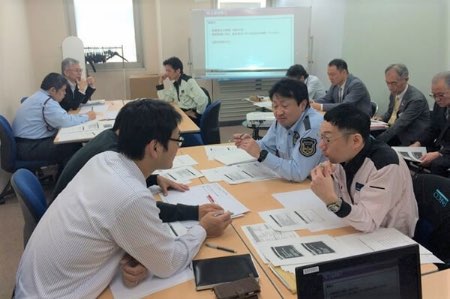Risk management Organization
The Risk Management Committee is chaired by the President and Executive Officer, and its members consist of PARCO executive officers. In addition to formulating risk management policies, determining annual plans, and revising this framework, it performs a series of risk management operations, including identification, evaluation, and prioritization of risks in general, formulation of response policies, implementation within company-wide strategies, monitoring, review, and improvement.
In principle, the Risk Management Committee holds meetings three times per year and reports to the Board of Directors as necessary.
Crisis Management Framework
The PARCO Group has established the PARCO Crisis Management Rules for the purpose of promptly and accurately responding to various crisis events that have occurred or are envisioned. In crisis management, our highest priority is fulfilling social responsibilities as a corporation, including protecting lives and ensuring safety, complying with the instructions and orders of relevant government agencies and disclosing factual information in a timely and appropriate manner. Led by the Emergency Response Headquarters, headed by the President and Executive Officer, and with the aim of resolving serious incidents, all employees engaged in PARCO Group operations will work together to minimize losses, recover from damages, and prevent recurrences.
PARCO Group Business Continuity Plan (BCP)
In the PARCO Group, our disaster-readiness efforts include periodic fire drills for PARCO building staff, coupled with paramedic response training courses, to protect lives and safeguard assets in the event of an emergency. In addition, to provide services on a continuous basis, we have procedures in place to prevent or minimize risks that could occur in the event of a major disaster.
The “PARCO Basic Business Continuity Plan for Major Earthquake Disasters” was formulated in 2011, and revises it about once a year in line with changes in the times, and updates and improves the contents.
We conduct regularly scheduled BCP drills each year to test our about to react quickly to scenarios simulating the occurrence of an actual major disaster. At Nagoya PARCO, we adopted a ground filtration system as a measure to ensure potable water supplies exist should a natural disaster occur. The filtered groundwater is used for drinking water and facility equipment throughout the complex.
PARCO’s Business Continuity Plan for Major Earthquake Disasters was formulated to ensure that PARCO can quickly resume business operations and fulfill its social mission even in the event of a large-scale disaster that damages our commercial facilities or impacts Head Office functions.
Upon confirming the safety of customers, shop staff, and PARCO Group employees, the plan provides direction on mobilizing the strengths of all employees to maintain a level of service and commercial space that will enable us to continue to pursue our corporate mission. The plan sets forth PARCO’s post-disaster recovery plans, ongoing support, and basic conditions for resuming business operations.

Proactively supporting local communities in the event of a disaster
Major earthquake disasters threaten not only businesses, but also local governments and residents, and cooperation with these groups is essential for the smooth and effective recovery of affected areas, including PARCO stores. We believe that proactive, mutual assistance for local areas and neighboring businesses should be carried out in parallel with the recovery of PARCO stores. PARCO’s Business Continuity Plan for Major Earthquake Disasters also sets forth our policy for providing assistance to customers who have difficulty returning home in the event of a disaster.
Pre-arrangements with tenant shops for sale of daily necessities
PARCO has made arrangements with shops that carry daily necessities—primarily food, medicine, outdoor goods, and light clothing such as underwear—so that these items can be provided or sold at outside locations in the event of a disaster to affected areas.
Collaboration with residents and government
-
Local cooperation, partnerships and support
To the extent possible, PARCO will provide voluntary assistance and relief support and equipment to victims of natural disasters in the areas in which we operate. We will also support regional restoration activities and work to provide information and other forms of aid through our tenant shops.
-
Cooperation with local governments
In the event of a large-scale disaster such as an earthquake, business continuity is necessary both from the perspective of resuming store operations and contributing to local recovery. For that reason, PARCO exchanges information with local governments not just when disasters occur, but in normal times too.
-
Mutual support among local businesses
PARCO is strengthening relationships with neighboring businesses in the areas in which we operate and exchanging information and establishing cooperative frameworks as a means of providing mutual support and assistance. In the event of a disaster, this cooperation helps facilitate local recovery by providing evacuation guidance, personnel, equipment, and supplies.
